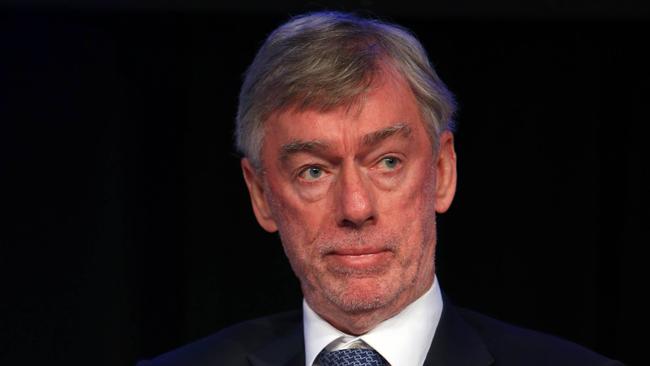Westpac memo warned of breaches
Westpac was warned it had a history of compliance issues with anti-money-laundering laws, according to memos.

Westpac was warned it had a history of compliance issues with anti-money-laundering laws and management had failed to take responsibility for “monitoring and overseeing” the reporting of international transfers, according to internal memos.
The reports also said senior bankers lacked a “complete view” of the risks associated with compliance systems.
According to the memos, the bank was repeatedly warned it was falling short of laws policed by Austrac long before a money-laundering case was lodged against the Commonwealth Bank in August 2017, triggering a sector-wide rush to check adherence to the legislation.
READ MORE: Proxies turn up heat on Westpac | Westpac beheadings soothe mob | King takes office with positive spin | Leaked quotes, then the end of Hartzer | Twitter abuzz with ‘Prince Andrew Interview’ moment | Hartzer payout not so golden | Embattled CEO falls on sword | Heads may roll, but no quick fix, writes John Durie | How Westpac board decided Hartzer’s fate
An addendum to the bank’s initial response to the royal commission in February last year says Westpac was warned in June 2017 that there had been a “poor handover” to management from an internal team that created the bank’s framework to comply with anti-money-laundering laws.
This had left management “unfamiliar” with different parts of a system used to report international transfers.
The Australian has learned the documents supplied to the royal commission were a key development in the establishment of the lawsuit Austrac lodged last week against Westpac, as they allowed the regulator unprecedented insight as to how the bank dealt with a string of known compliance failures.
Westpac is continuing to grapple with the fallout from allegations it breached the law 23 million times, including instances where it facilitated payments destined for child exploitation in The Philippines despite knowing customers were convicted pedophiles.
Shareholders are now primed to vote against key resolutions at the bank’s December 12 investor meeting and attack directors over governance failures.
This is despite the resignation of chief executive Brian Hartzer and the early retirement of chairman Lindsay Maxsted, announced this week.
Westpac is alleged to have failed to report to Austrac more than 19.5 million international funds transfer instructions (IFTIs) over five years, and the regulator has slammed “indifference by senior management and inadequate oversight” of the bank’s compliance regime.
Westpac self-reported its failure to send Austrac the IFTIs in September 2017 and notified investors in its annual report.
According to an internal breach system memo dated June 2017, Westpac had discovered the “end-to-end” process for reporting international transfers to the regulator was “not clearly understood” by senior bankers.
“As a result, management does not have a complete view of the risks to IFTIs reporting and may not fully understand the impact of changes to data on IFTIs reporting, potentially resulting in noncompliance,” the note says.
Based on discussions with Westpac’s money-laundering compliance division, there was a “poor handover by the original anti-money-laundering project team” responsible for building the system for reporting the transfers.
“There are gaps in coverage and understanding of responsibilities across the end-to-end data flow and reporting process for IFTIs,” the memo says.
“There is no team responsible for monitoring and overseeing the end-to-end IFTIs reporting process.
“Ultimate accountability for compliance with the IFTIs reporting requirements has not been defined and the allocation of responsibilities between Group AML (anti-money-laundering) and Divisional AML teams has not been agreed.”
The memo also warned there was “no monitoring or oversight over the completeness and integrity” of the information flowing to its financial crime system “to ensure completeness of items reported to Austrac” and that less than 1 per cent of IFTIs were reviewed each quarter.
According to the bank’s royal commission submission, Westpac knew in September 2017, following an internal review, that the bank had “until very recently … not appreciated that its subsidiaries operating outside of Australia were reporting entities for the purposes of the Anti-Money-Laundering and Counter-Terrorism Financing Act”.
All money transfer and remittance providers, financial services firms, gambling operators and gold traders must enrol with Austrac so it can guard against terrorism financing, human trafficking and tax evasion.
“A number of entities have been identified in the Westpac Group which have not been enrolled with Austrac,” said the 2017 Westpac internal log, which noted it had notified Austrac of the issue.
“This includes a number of entities located outside of Australia and some entities located within Australia.”
Another memo said Westpac had found, in November 2013, a “defect” in its Global Pay Plus payment system. However, Westpac said it investigated the root cause of the issue only “a number of months later” and did not fix the problem until September 2014.
“There are a number of long outstanding unresolved data issues impacting IFTI reporting. A detailed investigation of these items is still to be completed to determine the extent of potential noncompliance,” the Westpac memo says. “Westpac is not aware of any regulatory action continuing.”


